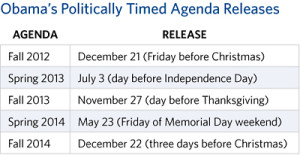One consequence of the events in Ferguson, Mo. is that people are talking with each other across ideological lines who usually don’t, a symbol being the attention paid on both left and right to Sen. Rand Paul’s op-ed last week in Time. And one point worth discussing is how the problem of police militarization manifests itself similarly these days in local policing and in the enforcement of federal regulation.
At BuzzFeed, Evan McMorris-Santoro generously quotes me on the prospects for finding common ground on these issues. The feds’ Gibson Guitar raid — our coverage of that here — did much to raise the profile of regulatory SWAT tactics, and John Fund cited others in an April report:
Many of the raids [federal paramilitary enforcers] conduct are against harmless, often innocent, Americans who typically are accused of non-violent civil or administrative violations.
Take the case of Kenneth Wright of Stockton, Calif., who was “visited” by a SWAT team from the U.S. Department of Education in June 2011. Agents battered down the door of his home at 6 a.m., dragged him outside in his boxer shorts, and handcuffed him as they put his three children (ages 3, 7, and 11) in a police car for two hours while they searched his home. The raid was allegedly intended to uncover information on Wright’s estranged wife, Michelle, who hadn’t been living with him and was suspected of college financial-aid fraud.
The year before the raid on Wright, a SWAT team from the Food and Drug Administration raided the farm of Dan Allgyer of Lancaster, Pa. His crime was shipping unpasteurized milk across state lines to a cooperative of young women with children in Washington, D.C., called Grass Fed on the Hill. Raw milk can be sold in Pennsylvania, but it is illegal to transport it across state lines. The raid forced Allgyer to close down his business.
Fund goes on to discuss the rise of homeland-security and military-surplus programs that have contributed to the rapid proliferation of SWAT and paramilitary methods in local policing. He cites Radley Balko’s Rise of the Warrior Cop, which similarly treats both manifestations of paramilitary policing as part of the same trend.
As McMorris-Santoro notes in the BuzzFeed piece, Rep. Chris Stewart (R-Utah) has introduced a bill called the Regulatory Agency Demilitarization Act, citing such unsettling developments as a U.S. Department of Agriculture solicitation for submachine guns. 28 House Republicans have joined as sponsors, according to Ryan Lovelace at National Review.
There has already been left-right cooperation on the issue, as witness the unsuccessful Grayson-Amash amendment in June seeking to cut off the military-surplus 1033 program. As both sides come to appreciate some of the common interests at stake in keeping law enforcement as peaceful and proportionate as situations allow, there will be room for more such cooperation. (& welcome Instapundit, Radley Balko, Bainbridge readers; cross-posted at Cato at Liberty)
Filed under: police, regulation and its reform

